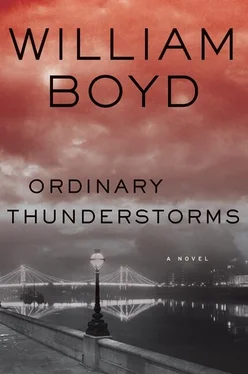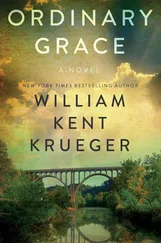He rehearsed his story as he walked back to Pimlico and Grafton Lodge — his modest hotel — pausing a couple of times to check his bearings in these near identical streets of terraced, white-stuccoed houses, and then, once he was sure he was going in the right direction, setting off again with new confidence, happy in the certitude of his decision-making process, pleased that this awful night — the terrible things he had witnessed — would have their proper judicial closure.
Grafton Lodge consisted of two of these terraced houses knocked together to form a small eighteen-bedroom hotel. Despite the overt pretensions of its name, the owners — Seamus and Donal — had a cursive pink neon sign in a ground-floor window that flashed ‘VACANCIES’ in best B-movie fashion and the front door was badged with logos of international travel agencies, tour groups and hotel guides — a shiny collage of decals, transfers and plastic honoraria. From Vancouver to Osaka, apparently, Grafton Lodge was a home from home.
To be fair, Adam had no complaints about his small clean room overlooking the mews lane at the back. Everything worked: the Teasmade, the shower, the mini bar, the TV with its ninety-eight channels. Seamus and Donal were charming and helpful and solicitous about his every need, yet, as he turned up the street towards the hotel and saw its pink neon ‘VACANCIES’ sign flashing, he felt a small shudder of dread vibrate through him. He stopped and forced himself to think: it was now well over an hour, nearly two hours, in fact, since he had fled from Anne Boleyn House. However, he had signed his name in the visitors’ register that the porter had proffered to him — Adam Kindred — and had written down Grafton Lodge, SW1, as his home address. That was the huge, catastrophic mistake he had been worried about, that was what had been nagging at him…The last person to visit Philip Wang before his death had obligingly left his name and address in the guest ledger. He felt a sudden nausea, considering the implications of this guileless self-identification as he approached Grafton Lodge. All seemed well — through the decal-encrusted glass door he saw Seamus at the reception desk talking to one of the chambermaids — Branca, he thought she was called — and he could see a few customers in the residents-only lounge bar. Across the street a black cab was parked, its ‘for hire’ light off, its driver dozing at the wheel — no doubt waiting for one of the revelling businessmen in the lounge bar to eventually emerge.
Adam urged himself onward: go in, go to your room, change your bloodied clothes, call the police and go to a police station — bring the whole horrible business to a proper, decent conclusion. It seemed the only sensible way forward, the only completely normal course of action, so he wondered why he decided to walk down the access lane at the end of the street and try to look up at his window from the mews behind. Something else was nagging at him now, something else he had or had not done, and that act, or non-act, was spooking him. If he could remember what it was and could rationalise about it perhaps he’d feel calmer.
He stood in the dark mews at the back of Grafton Lodge and looked at the back of the hotel for the window of his room and duly found it: dark, the curtains half-drawn as he had left them that morning for his interview at Imperial College. What world was that, he thought? Everything was still in order, nothing out of the ordinary, at all. He was a fool to be acting so suspic—
“Adam Kindred?”
Later, Adam found it hard to explain to himself why he had reacted so violently to hearing his name. Perhaps he was more traumatised than he thought; perhaps the levels of recent stress he had been experiencing had made him a creature of reflex rather than ratiocination. In the event, on hearing this man’s voice so close, uttering his name, he had gripped the handle of his new, solid briefcase and had swung it in a backhanded arc, full force, behind him. The immediate, unseen impact had jarred his entire arm and shoulder. The man made a noise halfway between a sigh and a moan and Adam heard him fall to the ground with a thud and a clatter.
Adam swivelled round — he now felt a surge of absurd concern: Jesus Christ, what had he done? — and he crouched by the man’s semi-conscious body. The man was moving — just — and blood was flowing from his mouth and nose. The right-angled, heavy brass trim at the bottom corner of Adam’s briefcase had connected with the man’s right temple and in the dim glow of the mews’ streetlighting he could see a clear, red, L-shaped welt already forming there as if placed by a branding iron. The man groaned and stirred and his hands stretched out as if reaching for something. Adam, following the gesture, saw he was trying to take hold of an automatic pistol (with silencer, he realised, a milli-second later) lying on the cobbles beside him.
Adam stood, fear and alarm now replacing his guilty concern, and then, almost immediately, he heard the approaching yips and yelps of a police car’s siren. But this man, he knew, lying at his feet, was no policeman. The police, as far as he was aware, didn’t issue automatic pistols with silencers to their plain-clothes officers. He tried to stay calm as the logical thought processes made themselves plain — somebody else was also after him, now: this man had been sent to find and kill him. Adam felt a bolus of nausea rise in his throat. He was experiencing pure fear, he realised, like an animal, like a trapped animal. He looked down to see that the man had groggily hauled himself up into a sitting position and was managing to hold himself upright there, swaying uncertainly like a baby, before he spat out a tooth. Adam kicked his gun away, sending it sliding and clattering across the cobbled roadway of the mews and stepped back a few paces. This man wasn’t a policeman but the real police were coming closer — he could hear another siren some streets away in clamorous dissonance with the first. The man was now beginning to crawl erratically across the cobbles towards his gun. All right: this man was looking for him and so were the police — he heard the first car stop outside the hotel and the urgent slam of doors — the night had clearly gone wrong in ways even he couldn’t imagine. He looked round to see that the crawling man had nearly reached his gun and was stretching out an uncertain hand to grab it, as if his vision was defective in some crucial way and he could barely focus. The man keeled over and laboriously righted himself. Adam knew he had to make a decision now, in the next second or two, and with that knowledge came the unwelcome realisation that it would probably be one of the most important decisions of his life. Should he surrender himself to the police — or not? But some unspecified fear in him screamed — NO! NO! RUN! And he knew that his life was about to take a turning he could never reverse — he couldn’t surrender himself, now, he wouldn’t surrender himself: he needed some time. He was terrified, he realised, of how bad circumstances looked for him, terrified of what complicated, disastrous trouble the baleful, awful implications of the story he would tell — the true story — would land him in. So, time was key, time was his only possible friend and ally at this moment. If he had a little time then things could be sorted out in an orderly way. So he made his decision, one of the most important decisions in his life. It wasn’t a question of whether he had chosen the right course of action or the wrong one. He simply had to follow his instincts — he had to be true to himself. He turned and ran away, at a steady pace, up the mews and into the anonymous streets of Pimlico.
♦
What drew him back to Chelsea, he wondered? Was it the fig tree and his momentary dream of expensive riverside apartments that made him think that this attenuated triangle of waste ground by Chelsea Bridge would provide him with safe haven for twenty-four hours until this crazy night was over? He waited until there were no visible cars on the Embankment and climbed swiftly over the spear-railings and into the triangle. He pushed through the bushes and shrubs away from the bridge and its swooping beads of light outlining its suspension cables. He found a patch of ground between three dense bushes and spread his raincoat flat. He sat on it for a while, arms hugging his knees, emptying his mind, and feeling an irresistible urge to sleep grow through him. He switched off his mobile and lay down, resting his head on his briefcase for a pillow and folded his arms around himself. He didn’t think, for once, didn’t try to analyse and understand, simply letting the images of his day and night flash through his head like a demented slide show. Rest, his body was saying, you’re safe, you’ve bought yourself some precious time, but now you need rest — stop thinking. So he did and he fell asleep.
Читать дальше












